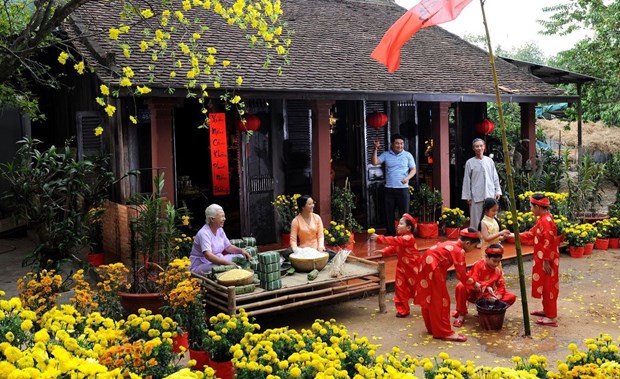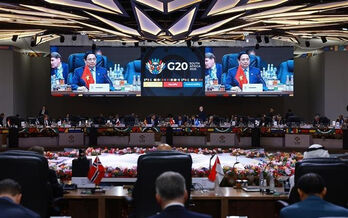
Tet is an occasion for family union. Illustrative image (Photo: vneconomy.vn)
For generations, the Vietnamese nation has treasured family tradition, considering family a home and a cradle to nurture people from childhood to adulthood.
In anytime, the cultural value of Tet is always preserved and upheld via traditional customs such as visiting ancestors’ graves, wrapping glutinous rice cake, cleaning the house and the Lunar New Year’s Eve offering.
There are popular scenes such as crowds in flower or Tet markets, children wearing new clothes, elderly scholars giving calligraphic words, family relatives meeting together, which bring people closer and deepen family love.
Since ancient times, the Vietnamese people have had the tradition of worshiping their ancestors. No matter how poor they are, every family tries to prepare for a few food trays to offer to them, thus reminding the merit of giving birth and upbringing, and strengthening filial piety in each child.
For the Vietnamese, a meal is a moment of reunion, a place to show respect, love and care for each family member. Children show respect to their grandparents and parents through every gesture of eating and drinking. A Tet reunion meal becomes more and more special because it not only offers quality food but also educates children on a healthy lifestyle. A Tet meal is considered the soul of unity and love, creating a close relationship among generations in the family.
Tet also affords a chance for family members to celebrate the longevity of their grandparents and parents. Depending on local customs, it can start from the age 60, showing their care for and respect to the elderly.
For generations, “Going home for Tet” has been considered a pilgrimage to the place of birth, only once a year. The reunion of a Vietnamese family every traditional Tet is not just the story of a family and carries emotional value, but also is the value of moral and cultural education and the matter of survival and sustainability of a nation. Preserving the beauty of family tradition is contributing to upholding national cultural identity in contemporary life, bringing people closer to the homeland, community and families and making them live more responsibly with the past, present and future./.
VNA
 Vietnamese PM proposes three strategic priorities for fair and just future at G20 Summit
Vietnamese PM proposes three strategic priorities for fair and just future at G20 Summit



